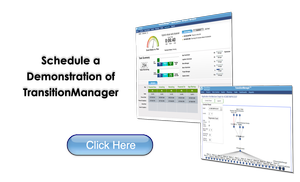It used to be very easy for IT to operate in a secure and predictable manner. Applications had their own dedicated servers, storage, database, etc. and as a result, failures were self-contained and it was easy to pinpoint root cause issues.
Today, the IT landscape has evolved to include virtualization, SDDC, cloud, SaaS technologies, converged infrastructure and more. Driven by pressures of digital business transformation, IT must keep pace with new, innovative services that businesses deliver to users by way of a mixture of systems, applications, and infrastructure that must operate seamlessly together. All this complexity makes it difficult to understand where specific applications are housed, and to control the full footprint of all systems and services that are relied upon to assure consistent delivery of business services.
Any change to your environment, no matter how trivial, cannot be done without considering how the change will impact business users. If you swap out hardware with another vendor, you still must maintain your end-to-end resiliency target for all applications and services that rely on that hardware. If you move a portion of your workload to the cloud, you must still assure the user resiliency targets are maintained. Today’s rapid pace of change opens organizations up to more risk which must be managed - risk of disruption, risk of data breach, and risk of compliance violations.
To manage and mitigate these high-stake risks and ensure resilience in IT and business operations, companies must have access to aggregate, accurate, cross silo information from across the enterprise, as well as business requirements for the availability and security of applications.
In their recently released Market Guide for IT Resilience Orchestration (ITRO) Automation, Gartner defined nine basic critical capabilities that we feel are essential for building resilience and improving IT service availability, recovery, and integrity through the orchestration, sequencing, and automation of underlying management workflows. We believe that TDS’s TransitionManager, one of the solutions reviewed in this guide, meets all nine critical criteria.
TransitionManager uniquely addresses IT resilience in three ways: providing access to actionable data from disparate tools across siloed business units; visualization of relationships across IT assets and dependencies at the application level; and the dynamic creation of runbooks to orchestrate and automate workflows. In short, TransitionManager provides intelligence and automation to keep things running.
At TDS, we see IT resilience, security, and compliance assurance to be fundamental to all decisions and changes made in IT. The Guide makes a compelling case that IT leaders must confront the realities of today’s complex IT landscape and shift toward resiliency assurance. It’s available for download and could inform your thinking about whether your disaster recovery plan will go far enough to address and sustain your current operating environment.
To read the Gartner Guide, click here.
Gartner Market Guide for IT Resilience Orchestration Automation, John Morency, December 2017.
Gartner does not endorse any vendor, product or service depicted in its research publications, and does not advise technology users to select only those vendors with the highest ratings or other designation. Gartner research publications consist of the opinions of Gartner's research organization and should not be construed as statements of fact. Gartner disclaims all warranties, expressed or implied, with respect to this research, including any warranties of merchantability or fitness for a particular purpose.

